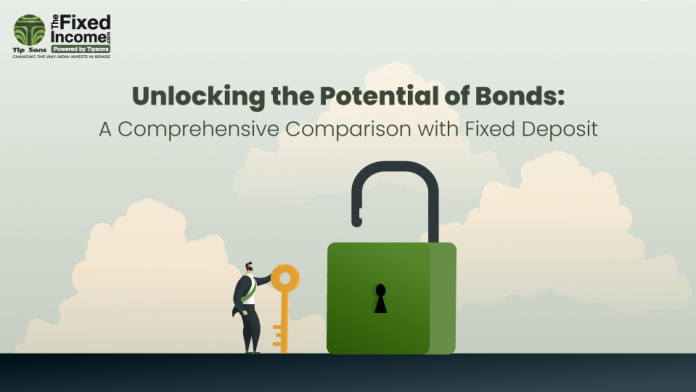Investing is an essential part of financial planning, and with so many alternatives out there, it can be challenging to find the ideal fit for your goals and risk tolerance. Hence, it’s important to take the time to weigh your choices carefully and make an informed decision.
Growing up in India, we were often advised by our parents to put our savings into a fixed deposit. While this still holds some truth, the landscape of investing has evolved since then and it is important to diversify your portfolio into different asset classes. Investment options that have gained considerable popularity in recent times are bonds. These investment vehicles offer varying degrees of returns and risks, making it essential to evaluate them carefully before making a decision.
In our latest blog post, we’ll dive deep into the world of investments. If you’re considering investing your hard-earned money, you may question whether bonds or fixed deposits are better for you.
What are Bonds?
Bonds are financial instruments representing debt obligations issued by governments or corporations. They serve as a means for the issuer to raise capital by borrowing money from investors who purchase the bonds.
When you invest in bonds, you essentially give a loan to the issuer. The issuer pays regular interest on the same for a period ranging from a few months to several years and repays the principal amount at maturity. Moreover,
- Bonds pay interest on a regular basis and have a fixed return rate throughout the tenure.
- The principal amount is given back to the investor when the maturity period ends.
- Bonds are considered safe investments backed by the government or corporations, with a low risk of default.
- Fixed returns allow investors to calculate expected returns in advance.
- Bonds are a good option for those seeking a low-risk, fixed-income investment.
- Government Bonds can be pledged for meeting collateral margin requirements in equity.
What are Fixed Deposits?
Fixed deposits are investment options that banks and financial institutions widely offer. Investing in fixed deposits involves depositing a predetermined amount of money for a specific period, commonly called tenure.
In exchange, the bank pays you interest regularly, monthly, quarterly, or annually, as per your preference. Briefly,
- Fixed deposits are investment options backed by banks.
- They offer fixed returns that do not fluctuate with market conditions.
- The tenure of a fixed deposit is predetermined, allowing for better financial planning.
- At maturity, the principal amount is returned without any hassle.
Comparison of Bonds and Fixed Deposits
Returns
Investors looking for higher returns may consider investing in bonds instead of fixed deposits. Generally, bonds offer a higher interest rate than fixed deposits and have the potential for capital appreciation.
This means that the bond value can increase over time, providing additional returns. In comparison, fixed deposits offer a fixed rate of interest throughout deposit tenure, which is usually lower than that of bonds. The rate of interest on fixed deposits differs from bank to bank.
It is important though for investors to consider the risks involved in the bonds before investing in the same and analyse the issuer’s creditworthiness to ensure the protection of funds.
Risk
If you’re seeking a low-risk investment option, you might consider Government bonds or fixed deposits. Government bonds are backed by the Government of India so there is no risk of default which is why it is also known as Sovereign Bonds or Risk-free guilt-edged securities. On the other hand, fixed deposits are issued by banks, corporates, etc. While fixed deposits are not completely risk-free, it’s worth noting that the maximum insurance cover per bank per holder is up to Rs.5 lakh. However, the likelihood of fixed deposits with banks like SBI, HDFC, etc defaulting is relatively low.
This lowers the risk of default, and the returns are fixed. It is important to note that both bonds and fixed deposits offer a reliable and low-risk investment option.
Liquidity
It’s worth noting that bonds tend to be less liquid than fixed deposits. Therefore, once you’ve made an investment in a bond, you won’t be able to withdraw your money until the maturity period is over. However, it’s possible to sell bonds on the secondary market before the maturity period ends.
On the other hand, fixed deposits are generally more liquid than bonds. Therefore, while you can withdraw your money from a fixed deposit before the maturity period, it’s crucial to note that you may be subject to a penalty for early withdrawal.
Taxation
Income tax laws require that interest earned on bonds is taxable, although some bonds offer tax benefits like Tax-Free interest income or 54EC Bonds etc.
Investors of all income levels and investment amounts are subject to the same tax rules when it comes to different types of bonds. Additionally, the government offers tax-free bonds to gather funds for various projects such as infrastructure development and renewable energy.
In India, interest earned on fixed deposits is fully taxable, and the applicable tax rate depends on an individual’s total taxable income and applicable surcharge/cess. This interest income is added to the individual’s total revenue and taxed accordingly depending on their income tax slab.
Investment Period
When it comes to investment periods, bonds usually have a longer time frame compared to fixed deposits. Depending on the Specific Bond and financial goals of the investor, the investment period can range from a few months to several years.
Investing in bonds can be an attractive choice as generally bond yields are expected to be higher than inflation over the next five years and beyond, resulting in positive real yields. Bond tenures can vary from 1 year to 30 years.
On the other hand, fixed deposits typically offer shorter investment periods compared to bonds. The tenure of fixed deposits can be anywhere from 7 days to 10 years, with higher interest rates offered for longer tenures.
FDs have a fixed tenure and interest rate at the time of investment. Conservative investors may find FDs attractive due to higher interest rates compared to savings accounts. Premature withdrawal of an FD is possible but may come with a penalty.
Conclusion
In India, bonds and fixed deposits are both secure investment choices that provide guaranteed returns and have a set time frame. Bonds typically offer higher returns than fixed deposits, but they are less flexible and have a longer investment horizon. Whereas fixed deposits offer lower returns but are more flexible and can be invested for a shorter as well as longer period.
Before investing in either bonds or fixed deposits, it is crucial to assess your investment goals, risk tolerance, and potential tax implications. Additionally, it is wise to compare the interest rates offered by various issuers or banks and choose the one that provides the most attractive returns.
Moreover, diversifying your investment portfolio is essential. Investing in a combination of bonds, fixed deposits, and other investment options can help mitigate risks and maximize profits.
It is also crucial to regularly review your investment portfolio and adjust it according to your investment goals and market conditions. With a sound investment strategy, you can unlock the full potential of bonds and fixed deposits and achieve financial success.
The Potential of TheFixedIncome.com
The specialists at TheFixedIncome.com possess an impressive set of skills and expertise that allow them to offer valuable insights into the potential of bonds as an investment option.
Our comprehensive knowledge and experience in the bond market can help investors better understand the various risks and rewards associated with investing in different types of bonds.
Through careful analysis of market trends and economic indicators, our experts can provide investors with invaluable insights and assist them in making well-informed investment decisions. We have curated Bond Guru- a dedicated knowledge portal simplifying the concepts around bond investing.
Collaborating with a Fixed Income expert can give you a comprehensive understanding of the bond market, allowing you to make informed investment choices aligned with your financial objectives. As a result, their knowledge is crucial in unlocking the full potential of bonds as an investment opportunity.






















